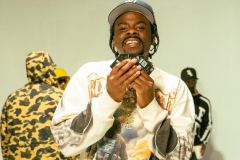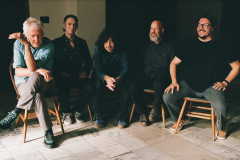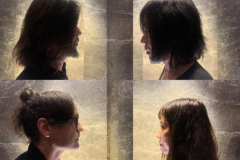From The Horse's Mouth: Zach Barocas (BELLS greater than or equal to symbol) on Solutions, Silence, or Affirmations
Former Jawbox drummer Zach Barocas, guitarists Stephen Shodin (Blood City, Coup Fourre) and Chris Ernst, cellist Gordon Withers (Office of Future Plans, et al.) and producer/bassist J. Robbins (Jawbox, Burning Airlines, Channels, Office of Future Plans) have teamed up as BELLS (greater than or equal to symbol) to create an album marked by its heft and grace, and furthers the evolution of the band’s brawny, inventive approach to instrumental writing and performing. With his trademark attack, Barocas emerges as forcefully as you’ve heard him. He and Robbins, whose 20-year friendship and collaborations are frequently noted for their landmark work in Jawbox, ground the session with liquid, mesmerizing shifts. Together as the rhythm section, their dialogue remains as it has always been: considerate, lively, assertive.
Ghettoblaster recently caught up with Barocas to discuss the new record, Solutions, Silence, or Affirmations (distributed by Dischord), the follow-up to 2010’s There Are Crashes LP and 2011’s Lamé EP. This is what he had to say about it…
When did you begin writing the material for your most recent album?
All told, Solutions, Silence, or Affirmations took roughly a year and a half to write, starting around the spring/summer of 2011. We don’t have a single method of putting our music together but most of this set came out of playing parts over and over until each of us had something we were happy with. As you might imagine, this can take some time but when it does come together, we’re clear on the dynamics, spirit, and feel of the tune.
A lineup change just prior to recording left the bass parts up in the air but our friend, J. Robbins, offered to play with us. He knows us and our music well and was able to work up his bass lines with characteristic sensitivity and alacrity. His is a delightful talent.
What was the most difficult song to take from the initial writing stage through recording and mixing? Why was it so troublesome?
Probably, “Shrift,” which, even more than its companions began life as a single part, sort of a quiet hardcore number. We frequently try to work out arrangements of what would normally be quiet passages played loudly; “Shrift” was an effort in the opposite direction, to play a loud idea (in this case, something like “New Day Rising”) almost inaudibly. We had an arrangement worked out before the session but because we composed the tune by playing it through repeatedly over the course of several months, we weren’t aware of how strange the arrangement might seem to someone who wasn’t there for the evolution. J. and Gordon (Withers, cello) rose to the occasion, of course, and the result is much more of what we hoped the tune would be than we ever imagined.
Which of the songs on the record is most different from your original concept for the song?
We’ve learned to not invest too much in how we originally conceive a number. By the time it gets treatment from the group, it enters into a state of near-constant flux until we can’t change it any more. Especially for this session, we were open to having the tunes change in the course of things.
That said, I think “No More Water” is the tune whose outcome surprised us the most. J.’s bass line came from a much farther-out relationship to the drums and guitars than the one we’d been working from with each other. It effectively changed the entire feel of the piece, moved it around in a way we did not anticipate. He kind of divided the measure in the middle of things in a tune whose only division was otherwise when we stopped playing and started again. It gave an entirely new shape to the arrangement. Avery graceful contribution.
Did you have any other guest musicians play or sing on the record?
Yes, we did. We approached the session without a bass player and were fortunate to have J. contribute bass to most of the session and other instrumentation to the whole album. He’s a profound influence on us as fans and collaborators and to have him so deeply involved was a wonderful experience for all of us. Additionally, our friends Michael Honch and Michael Pahn (aka Argos, a bass-only duo from DC) were able to join us for “Promenade,” and delivered what is no doubt the other contender for most-changed tune per the question above. Their sense of rhythm and harmony is unusual for electric basses, more aggressive and tuned in to the possibilities of ensemble playing. Their bass lines changed the sound of every section of “Promenade” but left its feel intact.
We were also joined by our friend and collaborator, cellist Gordon Withers. We’re always impressed by
Gordon’s work but having him take part in our music is especially rewarding. His genius is his generosity, an ability to immediately grasp what and where he can play to bring out the most important parts of a composition. His ear for this sort of thing is uncanny. We play with him every chance we get.
Who produced the record? What input did that person have that changed the face of the record?
J. Robbins produced the album with us. His input was integral, not least for his performances as described above. Speaking for myself, my musical maturation has occurred entirely in dialogue or collaboration with J. Consequently, I would rather record with him than anyone else. As a band, BELLS (greater than or equal to symbol) certainly feels a great deal of trust and inspiration in and from J.’s guidance and support.
Is there an overarching concept behind your new album that ties the record together?
The album title describes three variously-favored outcomes of conflict.
The track titles reflect certain received ideas about conflict, community, conviction, and resolution, and though we don’t necessarily accept those received versions ourselves, their subjects are of interest to us, culturally and aesthetically. We hope, too, that the titles convey a sense of what happens musically in the course of the album, of what goes into our band and its work.
Have you begun playing these songs live and which songs have elicited the strongest reaction from your fans?
We have been playing these tunes live, some of them for a while, seeing what happens, reworking them depending on how we respond to them first. Our new bass player, Tom Broucksou, brings a his own approach to the lines he’s inherited, his own sense of the grooves, melodies, and harmonies. As for fan responses, “No More Water” frequently moves the room pretty well. “Apostatic” is a rather pushy number (the verses are in 10/8) but people readily find the groove. “Brothers, Sisters” and “Metatron” usually elicit some hooting and hollering.
To be honest, however, our hands are pretty full when we’re playing this stuff. As long as people stay to the end, we’re happy.
(Catch the band live at the following dates:
Friday, August 2
Kung Fu Necktie
Philadelphia, PA
+ Pilot to Gunner
+ Six Acre Lake
Saturday, August 3
The Middle East
Cambridge, MA
+ Pilot to Gunner
+ Drew O’Doherty
Sunday, August 4
Machines with Magnets
Pawtucket, RI
Friday, September 6
Cake Shop
New York, NY
+ Thurn & Taxis
+ TBA
+ J. Robbins
Saturday, September 7
Paperhaus
Washington, DC
+ Argos
+ J. Robbins
+ The Caribbean)









Social Media